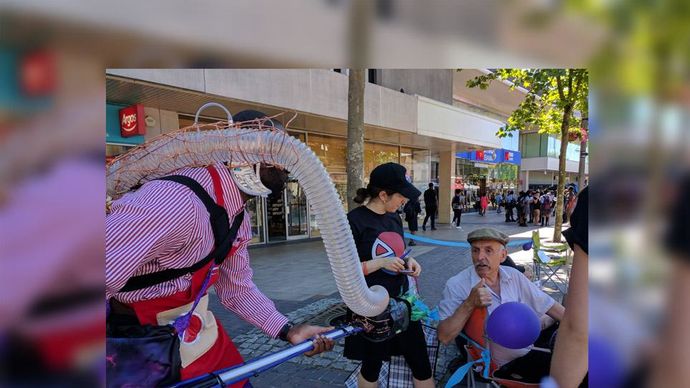Project information

A series of projects called ‘Performing Places’ in six areas of the UK produced significant improvements to well-being, community cohesion and social integration, engaging almost 12,000 community members as well as arts organisations and practitioners, Higher Education institutions and 3 local authorities.
An effective approach for bringing about community cohesion and social integration in fractured and troubled communities
Through projects based in Aberystwyth (Wales), Oldham (Greater Manchester), Tower Hamlets (London), Abergavenny (Wales), Camden (London), and Bexley (London), Mackey and her collaborators ‘demonstrated how, through the use of the arts, people can begin to change the way they see their environment and the people around them. What was even more impressive was that the improvements were replicated in individuals within small settings as well as larger communities’ (Senior Change and Engagement Manager, Parliamentary Digital Service).
Challenging Place
Challenging Place was conducted with diverse partners in three different parts of the country: Cyrff Ystwyth, a disabled and non-disabled performance company in Aberystwyth (Wales); Half Moon Theatre, a professional and participatory organisation for young people in Tower Hamlets (London); and Oldham Theatre Workshop, a community theatre organisation in Greater Manchester working with refugees, asylum seekers and migrants. Improved wellbeing reported by participants was such that the Oldham part of the Challenging Place project was shortlisted for the National Campaign for the Arts’ Hearts for the Arts Award – Community Cohesion in 2016.
Performing Abergavenny
Performing Abergavenny involved partnerships with local councils, community organisations, and a youth theatre in healing tensions and divisions around class, locality and history in this area on the England-Wales border. Performance activities in this project involved almost 800 participants, including families, young people, elders, and ‘night workers’, and about 2,000 observers, and demonstrated the contribution of such work to community cohesion and local governance.
Building on the practices and impacts of these projects, Mackey extended the nature, reach, scale, and impact of the activities in two consecutive follow-on projects:
Performing Local Places
Performing Local Places arose from invitations to partner with local councils in Camden (London) and again Oldham (Manchester), as a result of the impacts of the Challenging Place project. In Camden, the focus was on using performance practices with St Mungo’s Housing Association clients struggling with mental illness in supported accommodation. An external evaluation of the project found that this led to improved wellbeing and connectedness among residents, and improved involvement in the local community. St Mungo’s have since adopted the project’s processes into their own practice on a self-funded basis. Mackey was also invited to sit on Camden Council’s five-year Cultural Strategy Framework group. In Oldham, after extensive consultation, 17 school and community workshops, four days of street activities, and a festival were conducted as a means of assuaging disharmonies arising from cultural differences, particularly between settled groups and new Roma residents. The project reached approximately 1,000 residents, with an independent evaluation finding that ‘engaging 20% of an entire community is exceptional’ with 92% of respondents providing positive feedback and 67% feeling more positive about the community as result. A third of respondents also reported that the project had enabled them to engage with people of both different ages and different ethnic backgrounds.
As a result of the impact of Performing Local Places, Mackey was approached to conduct a similar project in three new authorities, one of which became the Bexley project.
Performing Places, Bexley (2017-19)
Performing Places, Bexley was commissioned by the London Borough of Bexley as part of A Place for Everyone, funded by the UK Ministry of Housing, Communities and Local Government. The project addressed a rise in tension between different parts of the community, which had led to widely publicised conflict between schoolchildren in September 2016. Bexley had also identified divisions between older and younger generations that were negatively affecting the town centre. The design and delivery of the project involved the council, as well as schools, libraries, social organisations, churches, retailers, arts organisations, and two higher education institutions in the town.
Across two years, over 8,000 people participated in 75 workshops, assemblies, talks and storytelling sessions and 9 days of street participatory performance. Participation ranged across the generations from 0-90 years old, making theatre available to many youngsters for the first time. 70% of participants surveyed said they felt more part of the community as a result of the project’s activities, 50% said they felt more open to people different from them, and 80% said they felt more positive about the town centre. The project has been taken forward by the council, in collaboration with Mackey, through local schools using education packs, running after-school clubs, and continuing to create performances.
Performing Places Bexley was used a case study in the London Impact Catalogue detailing Higher Education Institutions’ contribution to the capital. It was also shortlisted for the National Campaign for the Arts Hearts for the Arts Award for Best Arts Project – Community Cohesion, with one of the judges noting: ‘Performing Places Bexley started as a response to a significant local issue, but the scale of engagement and involvement, improved perceptions of the local area, and the lasting partnerships that have been formed, all demonstrate a project that has made a lasting impact on its community’.
